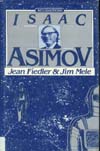This book is part of Frederick Ungar’s “Recognitions” series. Having not read any of the other books in the series, it’s impossible for me to tell how much of an impact that makes on this one and makes it more difficult to evaluate the book on its own merits.
This came out at about the same time as James Gunn’s superior Isaac Asimov: The Foundations of Science Fiction, and I happened to have read Gunn’s book first which is unfortunate as it makes this one look even worse by comparison. It’s a slim volume of only 110 pages and covers Asimov’s major fiction through just before the publication of Foundation’s Edge.
Fiedler and Mele show a reasonable familiarity with Asimov’s major pre-1980 fiction and they are about the only critics to look extensively at the “Lucky Starr” books, which is a point in their favor. They do not seem familiar with Asimov’s non-fiction, misapprehending the significance of his having written books on the Bible, for example.
Their fundamental thesis is taken from one of Asimov’s essays, “Social Science Fiction” from Is Anyone There? There Asimov postulates that sf is really about people in changing social circumstances. That’s all well and good, except that it doesn’t really describe Asimov’s own science fiction. Asimov rarely writes about people-as-they-really-are, passionate, emotional, irrational. He writes about people who think, not people who simply act. Indeed, his own idealized hero is really very much unlike himself—a man who would freely weep at mawkish poetry, update the machinery he used to write only with the greatest reluctance, and never fly anywhere. By accepting what Asimov says about sf at face value rather than by examining what his sf is really like, Fiedler and Mele get off on a wrong foot.
Their analyses of the various stories are interesting, however, even when they disagree with mine. They tend to dislike books with elaborate plots and hidden identities and motivations, such as “The Search by the Foundation” from Second Foundation and The End of Eternity, but that’s OK, really, as they defend their position well.


